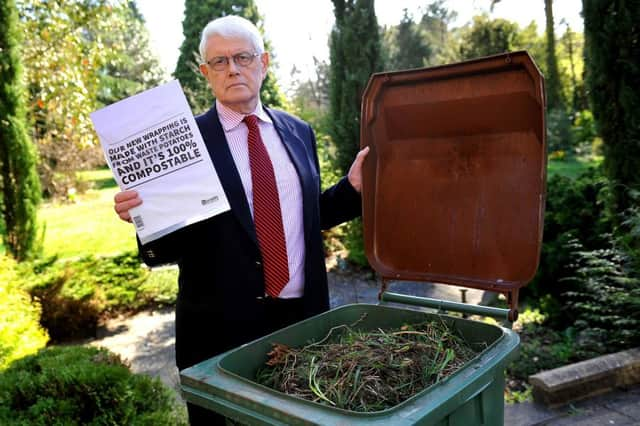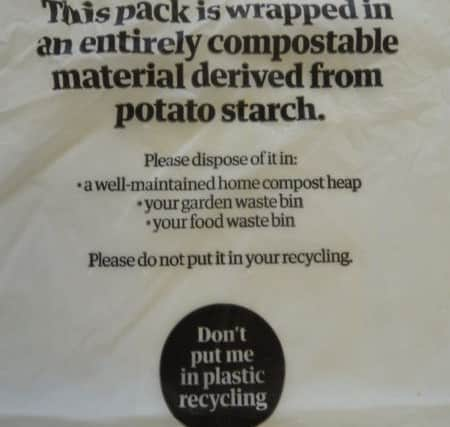Row blows up over disposal of bioplastic bags in West Sussex


Warnings were spelled out last month that bioplastic could contaminate compost made from recycled garden waste in the county. But now manufacturers are dismissing the warnings as ‘nonsense.’
Waste management firm Viridor - which is responsible for waste in West Sussex - says local residents should not place bioplastic bags in their garden waste or recycling bins.
Advertisement
Hide AdAdvertisement
Hide AdInstead, it says, both bioplastic and plastic bags should be put in household rubbish bins.


The issue has been highlighted by Horsham district councillor Philip Circus, cabinet member for waste and recycling, who is now raising the matter with West Sussex County Council.
Bioplastic bags are commonly used by a number of major companies and organisations including the National Trust, national newspapers and the online supermarket firm Ocado.
Mr Circus said: “It’s a major risk of contamination to recycling.”
Advertisement
Hide AdAdvertisement
Hide AdA Viridor spokesman said that compost produced in West Sussex is developed to strict guidelines set by the British Standards Institution, which ensure the soil produced is certified as safe to use and be put back into the land.
“We ask residents to not place bioplastic material - of which there are a number of variations - in their garden waste bin as unfortunately any plastic packaging, even packaging which states it is compostable, could ruin the quality of the compost produced.
“West Sussex County Council compost sites only take garden waste, they would not comply with regulations and are not certified to accept food waste for composting. This means that even compostable packaging that has contained food or liquid would not be allowed at any of our compost facilities.
“This is another reason why we are unable to accept these items for composting via kerbside garden waste collections or Household Waste Recycling Sites.
Advertisement
Hide AdAdvertisement
Hide Ad“We ask residents not to place bioplastics in their recycling bin at home, as the specialised sorting machinery at our Materials Recycling Facility doesn’t recognise it as plastic and we are unable to recycle it.
“We would, therefore, advise residents to place bioplastic material or compostable packaging in their household rubbish bin. Alternatively, they could compost the items in their home compost bin, which is not required to conform to such strict regulations.”
However, David Newman, managing director of the BBIA - a UK trade body for companies producing bio-based and biodegradable products - said: “To say compostable bags contaminate compost is nonsense.”
He said there were strict standards which determined if a packaging material was compostable.”The wrappers used for these magazines meet this standard.
Advertisement
Hide AdAdvertisement
Hide Ad“What this means is that they will biodegrade naturally in a compost plant within a maximum of 180 days. In the case of thin films like these, most biodegrade within one month, and this depends upon the treatment process.
“Should some of the bag not fully biodegrade when the compost is mature it will not pollute soil because it will continue to biodegrade in the soil.
“Such bags will also normally biodegrade in a home composting heap. Home composting is however very variable, it depends upon the capacity of individuals to manage their compost heaps, and some are better than others.
“In short, we cannot understand why Viridor uniquely should be having problems with these materials, which are easily treated in the UK and all over the world. Indeed, by substituting non recyclable plastic films, they are reducing plastic waste.”